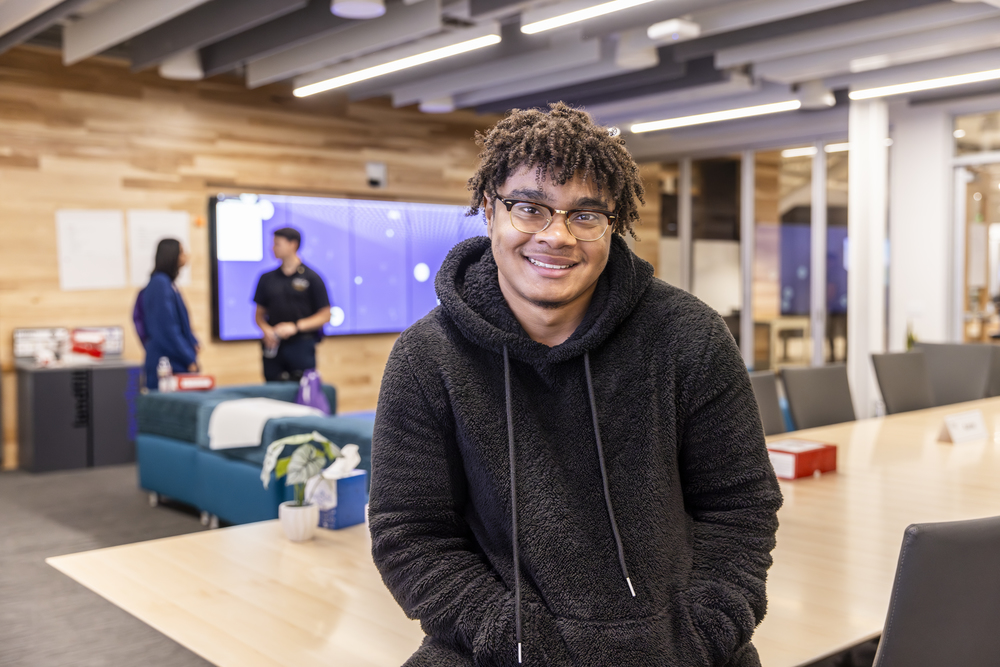
Thinking about pursuing a degree in Business Administration and Accounting, your first thought might be working in a standard office setting, but one Austin Community College District (ACC) is taking his passion out-of-this-world.
ACC student Ronald Ngamby is back from completing his third mission with the special NASA Community College Aerospace Scholars (NCAS) program. He began at ACC in August 2021 and plans to transfer to either the University of Texas at Austin or Texas A&M at College Station.
Read more about his story below.
Written by Ronald Ngamby, ACC Business Administration and Accounting Student
GETTING STARTED: MISSION 1
I applied to the NASA program because I was looking for internships first. I realized the internships I was looking at would force me to move to Houston, and I couldn’t do that. When I saw NCAS Mission 1 Discover was a virtual program, I said, “Why not?” and went for it.
My mindset was you always have a chance when you apply, but when you never try to apply, you have zero chance to make it. When I found out I was selected, I was ecstatic. I was surprised because when you think of NASA, you think only of STEM-related fields, but that’s not true. NASA has jobs for almost every major.
The five-week program started in the summer of 2023. We learned and researched NASA’s mission goals and multiple directorates. We would submit papers answering specific questions about these directorates and explaining what we learned. At the end of the program, we created a final infographic, putting together all the knowledge we gained from Mission 1. In Mission 1, there are around 300 students, but on Mission 2, there are around 180 students. In my experience, doing your work on time, answering all the questions properly, and finishing each assignment will allow you to continue to Mission 2.
MOVING FORWARD: MISSION 2
There are two sets of Mission 2, but instead of five weeks like Mission 1, it’s one week in the fall. My Mission 2 was to Explore, where we were put in a team of 10 and assigned to a specific role. In this mission, you simulate a job and work with a team to create a presentation for NASA panelists. The challenge we were given was to land a rover on the moon and explain its purpose and what we would achieve. For my specific role, I was a Floor Specialist operationalist. In simple terms, I’m supposed to map out the coordinates of the moon where we will land, our travel plan, and what we are doing on the moon’s surface.
Yes, you’re probably wondering how the heck I did that in a week. Trust me, NASA gives you lots of valuable resources and has professionals in each job you’re assigned. You go to meetings every day so you can understand what’s going on. It seems like a lot, but it will be alright if you work with your team and ensure you have fun.
The NASA panelists will also have questions and critiques once you finish Mission 2. To be accepted into Mission 3: Innovate, you must combine the individual scores of your Mission 1 and Mission 2.
THE FINAL OPPORTUNITY: MISSION 3
Mission 3 is a three-week program. The first two weeks are virtual and hosted online. The third week is an opportunity to meet in person at a NASA research center.
For me, I was flown to the AMES Research Center in San Jose, California. Before you can make it there, you must work in a team of 10 to face a given challenge. Our specific challenge revolved around the NASA Advance Air Mobility program (AAM), specifically Consumer Enterprise and goods and services.
The goal was to identify a problem and propose a potential solution. During the two weeks online, we worked to create a final proposal that we would then present to NASA panelists in person. Once you get to the in-person portion, you get to tour the NASA research center, learn more about what they do at that specific center, and even talk to amazing people at NASA.
We also visited the University of California, Berkeley, which was an incredible experience. It’s a great networking opportunity, learning experience, and a fun time. This also helps you with presenting skills and the pressure of speaking to people you may not be comfortable speaking to. You will learn more about yourself taking on these missions and learn to work with a team.
Don’t worry about what major you’re studying or if you think you’re not up to the challenge. Anyone can do this, especially if you come into it with an open mind and ready to learn. You will surprise yourself with your capabilities, and I know that all ACC students can tackle this challenge or any other opportunities that ACC or the world provides. Just believe in yourself, because I’m just a business major who was able to go to space.
Tags: accounting, business administration, NASA, NASA Community College Aerospace Scholars, NCAS
Back to Top
